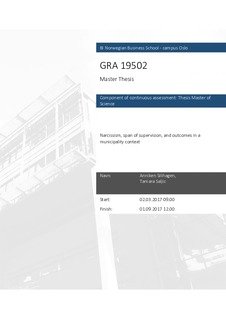Narcissism, span of supervision, and outcomes in a municipality context
Master thesis
Permanent lenke
http://hdl.handle.net/11250/2477733Utgivelsesdato
2017Metadata
Vis full innførselSamlinger
- Master of Science [1622]
Sammendrag
Purpose: To enhance the understanding of the complex interplay between leaders
and followers we examined the link between narcissistic leadership and two
follower outcomes; loyalty and job satisfaction in a Norwegian municipality
context. We further investigate whether span of supervision can moderate the
hypothesized negative relationship between leader narcissism and the follower
outcomes and function as a buffer.
Design: The present study relied on cross-sectional research design where 224
respondents from various municipalities answered electronic questionnaires. Data
was collected separately from leaders and followers.
Findings: Our findings revealed negative correlations between narcissistic
leadership and both job satisfaction and loyalty. However, the HML analysis did
not find support for moderating effects of span of supervision.
Implications: First, our results show that higher levels of leader narcissism result
in lower levels of loyalty and job satisfaction in a Norwegian Municipality setting.
Second, consistent with Affective Events Theory our data imply a process where a
negative work event in terms of narcissistic leadership, results in affective
responses in terms of lower scores on loyalty and job satisfaction.
Value: To our knowledge, this is the first study connecting narcissistic leaders to
decreased loyalty and job satisfaction in a municipality context. Thus, our results
imply that municipalities are yet another arena where narcissists can unfold,
despite the prevalent focus on the private business sector. Second, this is the first
study connecting lower levels of loyalty to higher of narcissism, adding
knowledge about the detrimental effects narcissistic leaders can have for the
associated employees.
Beskrivelse
Masteroppgave(MSc) in Master of Science in Leadership and Organizational Psychology - Handelshøyskolen BI, 2017
